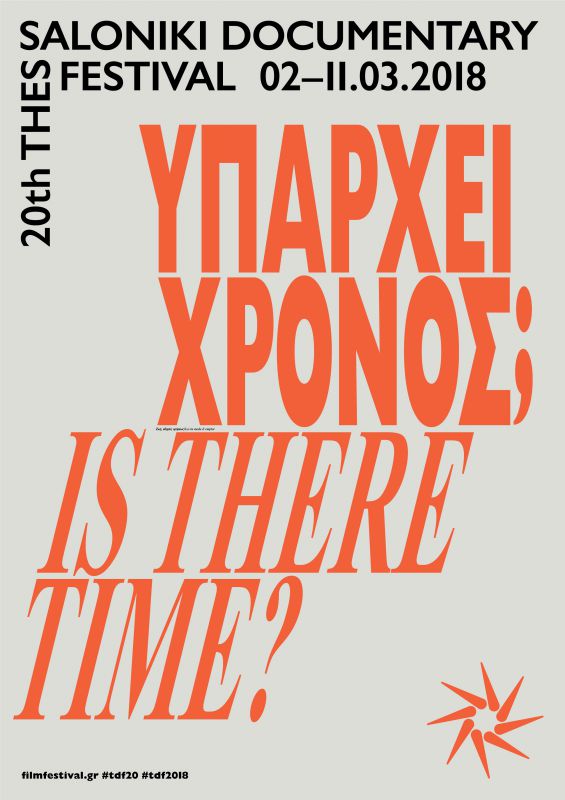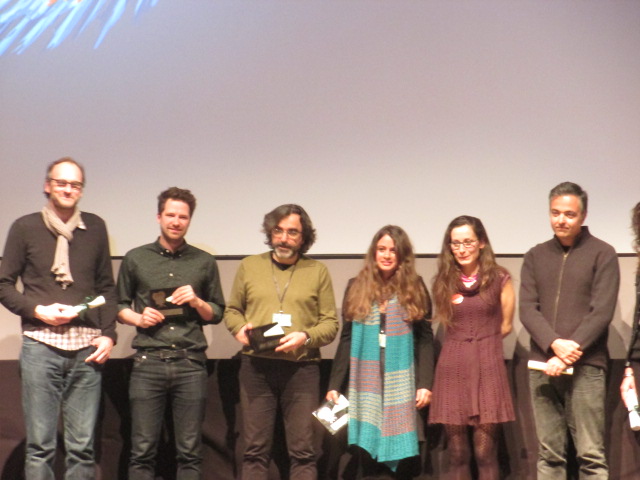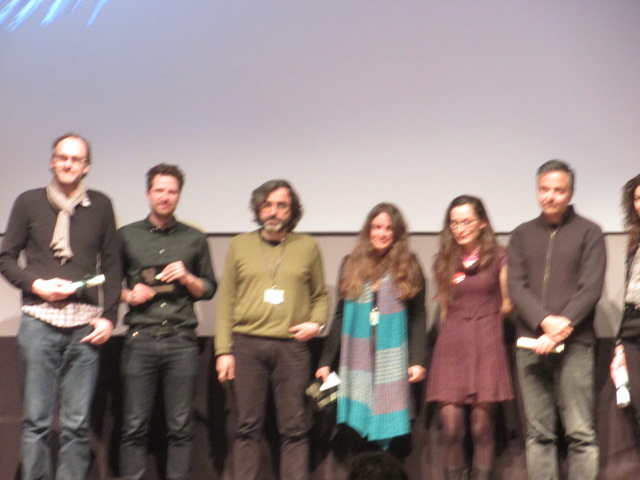|
|
||
|
Pro Tools
FILMFESTIVALS | 24/7 world wide coverageWelcome ! Enjoy the best of both worlds: Film & Festival News, exploring the best of the film festivals community. Launched in 1995, relentlessly connecting films to festivals, documenting and promoting festivals worldwide. Sorry for the interruption, we needed to correct and upgrade some modules. Working on a new website. For collaboration, editorial contributions, or publicity, please send us an email here. You need for put your full detail information if you want to be considered seriously. Thanks for understanding. User login |
PRESS CONFERFENCE: LION SOULS / CARTOGRAPHY OF LONELINESS / AT NIGHT I FLY / I AM A WOMAN NOW
AT NIGHT I FLY by Michel Wenzer
-14th TDF PRESS- PRESS CONFERENCE LION SOULS / CARTOGRAPHY OF LONELINESS / AT NIGHT I FLY / I AM A WOMAN NOW As part of the 14th Thessaloniki Documentary Festival, a Press Conference was held on Friday, March 16, 2012. Participating were directors Manu Gerosa and Salva Munoz (Lion Souls), Nocem Collado (Cartography of Loneliness), Michel Wenzer (At Night I Fly) and Alex Bakker, researcher for the film I Am a Woman Now by Michiel Van Erp. The documentary At Night I Fly records the daily life and artistic outlet of prisoners in the notorious Folsom prison in California. The director’s emotional involvement to his project has to do with the fact that he was a foster child since the age of 9, which for him felt exactly like a prison. The emotional isolation made him feel connected to the men in the film, for example with a prisoner “who writes poems as a survival mechanism in the harsh conditions he is in”. He explained how he was able to gain access to the prison and, more importantly, how to get the prisoners to open up to him. “It took 5 years to finally gain access to the prison, but that wasn’t really the hard part. Other crews have shot in prisons, but the difference can be found in the perspective. You can feel sorry for someone who you think is innocent, or you can feel fear for them; most people doing prison documentaries only care about the living conditions. With me, the prisoners –even the ones who didn’t want to participate- understood that they were dealing with someone who really wanted to hear their stories. They appreciated my genuine interest and opened up to me. In that sense, the film is a rarity”, said Wenzer. He concluded by saying that he had decided from the beginning not to include anything about the crimes the prisoners had committed, since “these acts are always present and follow them everywhere”. Nocem Collado discussed Cartography of Loneliness, which was her first film. She uncovered several horrific statistics about the lives of young widows in countries such as Afghanistan, India and Nepal. “I became interested in this issue when I first read about the extremely high percentages of widows in the general population in these places. I lived with all of them for months, in the ashrams where they often take refuge, and lived my life exactly like theirs. Most of them were married to much, much older men and some of them had first been married when they were 2 or 3 years old. In Nepal they marry before their first menstruation, while the husband often has relationships with other women; as a result AIDS is transmitted in high numbers and they often give birth to children with HIV. Also, when they marry, they move with their husband’s families; when the husband dies, they are considered bad luck and thrown into the streets. They then need to support themselves and their children; in Afghanistan, they can remarry their husband’s brother or father, but, if they marry someone outside their family they lose their children; that is not a custom, it is the law. In Nepal and India remarrying is forbidden; in the latter, there are 14000 widows living in a city which, according to tradition, is a place where you are not reborn if you die there: their lives are so horrible that they do not want be reincarnated, not even in the form of a snake”. When asked if the film affected the lives of these women, she replied that she has screened the film in India, where the women realized that they are not the only ones who face these horrors. “It is extremely hard to change their conditions; only education can do that and not the assistance of the westerners, who want to impose their own mentalities. These countries receive huge amounts of money from NGOs for women’s rights, but I never saw this money anywhere”. In the film Lion Souls, Manu Gerosa and Salva Munoz record the stories of two men, an Italian doctor who has been living in Zimbabwe for decades and helps sick people all over the country and 24-year-old native Thomas, who was beaten by soldiers and suffered sever damage to his spine. Continuing in the same vein as Ms Collado, Manu Gerosa stated that “We collaborated with an NGO to make a promotional video about the particular conditions; then we were free to make our own documentary, exactly as we wanted it”. Salva Munoz talked about Thomas, who was originally a secondary character, but gradually became one of the two protagonists in the film; as he was sent to Italy for surgery, the two directors started shooting the process of his rehabilitation. “Thomas was lucky, because in Zimbabwe, if you are beaten by the military you are going to die. The only reason he survived is that they left him for dead, didn’t realize he was still alive”. In addition, the filmmakers said that people often say to them that they have made a beautiful, hopeful film, but –having witnessed such horrible events as local doctors telling AIDS patients to have sex with young children as a cure- they only realized it after it was finished. Finally, Alex Bakker, researcher for I Am a Woman Now, which narrates the stories of elderly women who had a sex change in the 1960s in the clinic of doctor Burou in Casablanca, initially talked about how much time he spent looking for the film’s characters. “We started from the Casablanca clinic, which from the 1950s to the 1970s was the only place that would perform a sex change operation (and vaginoplasty).” They looked for them for a year and a half and still were able to locate only about 20. “None of the women have regretted their decision. The woman from Germany perhaps regrets, not the sex change itself, but the fact that life became extremely complicated after that, as she was for many years in a relationship with a woman who almost wanted her to change back into a man. It was amazingly brave of them to be transgendered in an age that had zero tolerance for that; today things are a bit easier. The other thing they all have in common is that they have experienced a lot of loneliness in their lives”. The films belong to sections that are funded, amongst other 14th TDF activities, by the European Union - European Regional Development Fund under the Central Macedonia ROP 2007-2013.
-14th TDF PRESS RELEASE- 17.03.2012 | Thessaloniki's blog Cat. : Afghanistan Alex Bakker Behavior California Casablanca Casablanca clinic Central Macedonia Director Emotions Entertainment Entertainment Ethology European Regional Development Fund European Union Folsom prison Germany I Am a Woman India Italy Lion Souls Loneliness Manu Gerosa Marriage Michel Wenzer Mind Nepal Person Career Person Relation Philosophy of love PRESS CONFERFENCE: LION SOULS / CARTOGRAPHY OF LONELINESS / AT NIGHT I FLY / I AM A WOMAN NOW Quotation researcher Salva Munoz Social Issues Social Issues Technology Technology The 14th Thessaloniki Documentary Festival Van Erp Zimbabwe FILM
|
LinksThe Bulletin Board > The Bulletin Board Blog Following News Interview with EFM (Berlin) Director
Interview with IFTA Chairman (AFM)
Interview with Cannes Marche du Film Director
Filmfestivals.com dailies live coverage from > Live from India
Useful links for the indies: > Big files transfer
+ SUBSCRIBE to the weekly Newsletter DealsUser imagesAbout Thessaloniki Mcmahon Vanessa Mcmahon Vanessa Vanessa McMahon Covered the 13th and 14th, and 16th edition. Through its tributes, it focuses both on discovering filmmakers with a unique cinematic point of view, and on the internationally recognized for their contribution to documentary. Contributions from Buno Chatelin http://tdf.filmfestival.gr/default.aspx?lang=en-US&loc=6&page=760 View my profile Send me a message My festivalThe EditorUser contributions |





























